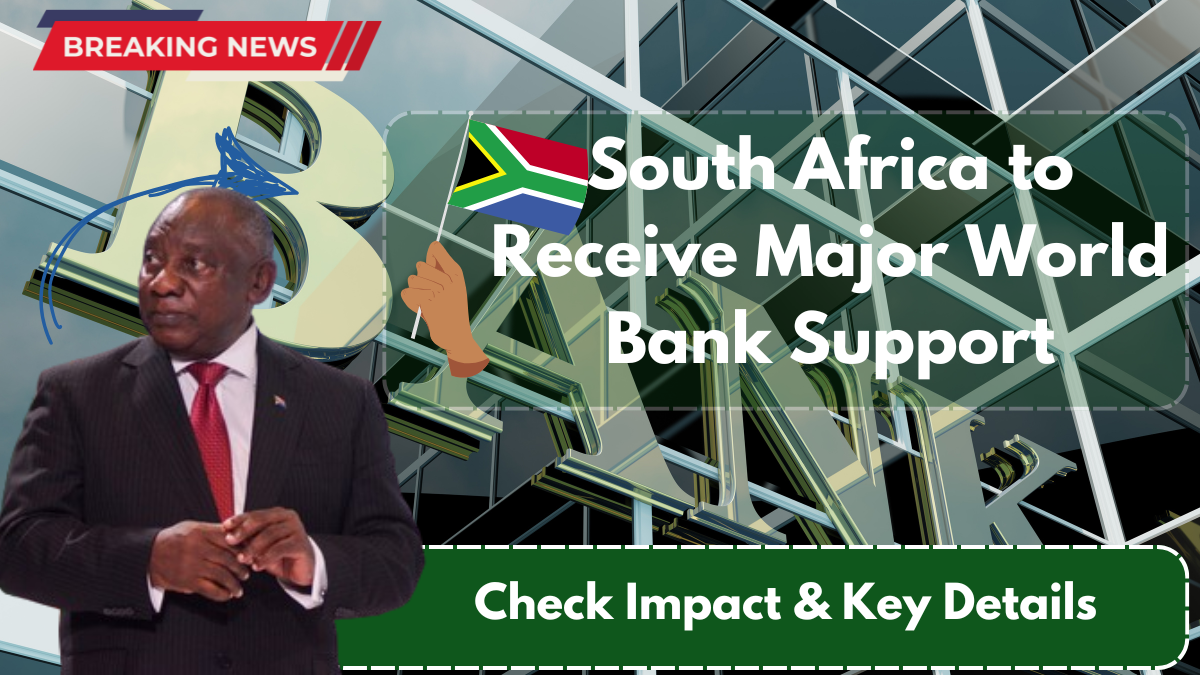South Africa is set to undergo a major transformation with the World Bank’s newly announced support, aimed at addressing the country’s pressing challenges in energy, education, economic growth, and environmental conservation. These initiatives are designed to create long-term stability, foster sustainable development, and bring tangible benefits to businesses and citizens alike.
Let’s delve into how this support will reshape South Africa’s future across multiple sectors.

The World Bank’s Strategic Support for South Africa
The World Bank’s commitment to South Africa involves substantial financial and technical assistance across four key sectors:
| Sector | Key Initiatives |
|---|---|
| Energy | $1 billion loan for energy reforms, focusing on renewable energy and security. |
| Education | Programs to enhance literacy, numeracy, and teacher training. |
| Economic Growth | Trade expansion strategies, market integration, and export performance improvement. |
| Environmental Conservation | $8.9 million grant for biodiversity protection in national parks. |
This structured approach is set to drive economic resilience and improve the overall quality of life for South Africans.
Addressing the Energy Crisis: A Shift Towards Stability
One of the most pressing issues in South Africa is its ongoing energy crisis, which has led to frequent power outages, severely affecting daily life and economic productivity. The World Bank’s $1 billion loan aims to tackle this crisis through:
Key Focus Areas:
- Reforming the Power Sector: Unbundling Eskom, South Africa’s state-owned power utility, to create a more competitive and efficient energy market.
- Encouraging Renewable Energy: Investing in solar, wind, and other renewable energy sources to reduce reliance on coal.
- Strengthening Energy Infrastructure: Upgrading transmission and distribution networks to minimize power cuts.
Impact on Citizens and Businesses:
- More Reliable Electricity Supply: Reduced power outages will enhance business operations and improve daily life.
- Job Creation: Expansion of the renewable energy sector will generate employment opportunities.
- Economic Growth: A stable energy supply will boost investor confidence and industrial productivity.
Transforming Education: Building a Skilled Workforce
Education plays a critical role in shaping South Africa’s future. Despite efforts to improve the education system, challenges remain, particularly in early childhood literacy and numeracy.
Key Initiatives:
- Enhancing Learning Outcomes: Strengthening literacy and numeracy programs in primary schools to build a strong educational foundation.
- Teacher Training Programs: Equipping educators with modern teaching techniques to improve instruction quality.
- Infrastructure and Resources: Allocating funding for better learning materials, school infrastructure, and digital tools.
How This Benefits South Africa:
- Better Education for Future Generations: Improved teaching quality ensures children receive a solid education.
- Higher Employment Rates: A more skilled workforce will drive economic growth and reduce unemployment.
- Global Competitiveness: Strengthening the education system allows South Africa to better compete in the global market.
Boosting Economic Growth Through Trade and Market Expansion
International trade serves as a powerful engine for economic prosperity. The World Bank’s support aims to help South Africa leverage its trade potential and integrate more effectively into the global economy.
Strategic Areas of Focus:
- Trade Policy Reforms: Simplifying export regulations to facilitate easier market access.
- Infrastructure Investment: Upgrading transport and logistics networks to enhance trade efficiency.
- Regional and Global Integration: Utilizing agreements such as the African Continental Free Trade Area (AfCFTA) to expand South Africa’s market reach.
Benefits for Businesses and Consumers:
Business Expansion: Local companies will have greater opportunities to export their products and services.
Job Creation: Increased trade can lead to more employment opportunities in various industries.
Diverse Market Offerings: Consumers will benefit from a wider variety of goods and competitive pricing.
Environmental Conservation: Preserving South Africa’s Natural Heritage
Beyond economic and energy reforms, the World Bank is also investing in environmental conservation to protect South Africa’s rich biodiversity. With an $8.9 million grant from the Global Environment Facility (GEF), several key initiatives are being implemented.
Primary Goals:
- Protecting National Parks: Enhancing conservation efforts in Kruger National Park, Addo Elephant National Park, and iSimangaliso Wetland Park.
- Community Engagement: Involving local communities in environmental protection to promote sustainable livelihoods.
- Biodiversity Preservation: Safeguarding wildlife and natural habitats to maintain ecological balance.
Impact on South Africa:
Sustainable Tourism Growth: Conservation efforts will attract more eco-tourists, boosting local economies.
Improved Ecosystem Health: Protecting biodiversity helps maintain air and water quality.
Long-Term Environmental Benefits: Ensuring future generations inherit a thriving natural environment.
Also Read: S$700 Payout 2025: New Payment Dates & Eligibility Details Revealed
Final Thoughts
The World Bank’s multi-sectoral support is a game-changer for South Africa, addressing critical issues in energy, education, economic growth, and environmental conservation. These initiatives promise long-term stability, economic resilience, and improved quality of life for all South Africans.
By staying informed and engaged with these developments, businesses and individuals can better position themselves to take advantage of emerging opportunities in a rapidly evolving landscape.
Frequently Asked Questions (FAQs)
1. How will the World Bank’s $1 billion loan impact South Africa’s energy sector?
The loan will support energy sector reforms, promote renewable energy projects, and improve power infrastructure to ensure a more reliable electricity supply.
2. What changes can we expect in the education sector due to this support?
The World Bank’s initiatives will focus on improving early childhood literacy, training teachers, and providing better educational resources to enhance learning outcomes.
3. How will trade and economic reforms benefit small businesses in South Africa?
By streamlining trade policies, improving infrastructure, and expanding market access, small businesses will have better opportunities to export and grow.
4. What are the long-term benefits of environmental conservation efforts?
These efforts will protect biodiversity, boost sustainable tourism, and improve ecosystem health, ensuring long-term ecological and economic benefits.
For More Information Click Here
Akesh is a furniture expert with years of experience in design and craftsmanship. Specializing in sustainable materials, he shares his expertise to help people create stylish and functional living spaces.
